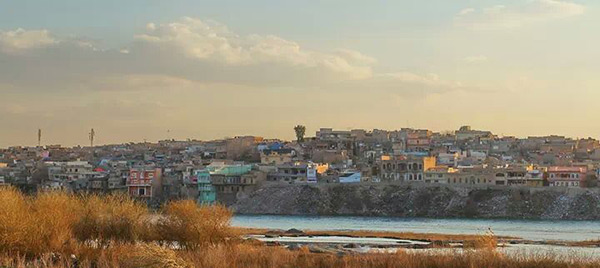Summary | Excerpt | Reading Guide | Discuss | Reviews | Beyond the Book | Read-Alikes | Genres & Themes | Author Bio

One Man's Remarkable Quest to Save the Mosul Zoo
by Louise CallaghanThis article relates to Father of Lions
Mosul, Iraq's second-largest city after Baghdad, lies on the banks of the Tigris River. Mosul's current boundaries encompass the remains of the old Assyrian city of Nineveh, and signs of civilization in the area date back as far as 8,000 years ago. From the 8th century onward, Mosul was considered a key cultural and economic hub, and it continued to build its influence during a series of dynasties lasting through the 12th century. It has since been the site of several conflicts and takeovers, including a Mongol invasion in 1258, Ottoman Turk rule from 1534 to 1918, British occupation after World War I, a U.S. raid in 2003 that led to the killing of Saddam Hussein's sons Uday and Qusay Hussein, and ISIS control from 2014 through 2017.

Mosul has a long history as a cultural crossroads, with a diverse population made up of many different ethnic and religious groups. Before the ISIS takeover, Mosul's Old City, located on the West Bank of the Tigris, was visibly reflective of that diversity. Mosques, churches and various monuments displayed the intersection of co-existing religious and cultural elements. For example, the famous al-Nouri mosque with its tilted minaret boasted architecture reminiscent of Central Asian and Persian traditions.
ISIS (the "Islamic State in Iraq and Syria," also known as IS, ISIL and Daesh), a terrorist group with an extremist interpretation of Sunni Islam that began as an al-Qaeda splinter group, started its seizure of Mosul in June of 2014. The group's attempt to take over the city was part of a wider effort to establish an Islamic caliphate, or state, in the region. Defeating the local government and the Iraqi army through force, ISIS soon gained control over Mosul, taking charge of administrative functions, education and numerous aspects of civilian daily life.
The fallout from the occupation of Mosul and subsequent moves to retake the city was, and remains, devastating to the traditions and culture of the local people. ISIS imposed oppressive rules on the populace, including bans on smoking, drinking and books, as well as strict dress codes, and harshly punished those who disobeyed. In addition, they singled out certain religious and ethnic groups—such as Yazidis, Christians and non-Sunni Muslims—for displacement, abuse, captivity and execution. They also destroyed much of the city's rich artistic and cultural history, including ancient fortifications and monuments of Nineveh.
October of 2016 marked the beginning of an effort to retake the city on the part of Iraqi forces—with the help of the U.S. military, Kurdish and Shia forces, and Sunni tribal fighters. Iraqi special forces entered the city in November. Despite ISIS resistance, eastern Mosul had returned to the control of the Iraqi government by January of 2017. In July of 2017, Iraqi Prime Minister Haider al-Abadi declared the effort to retake the city successful. However, the fighting of the past nine months had been extremely destructive, leaving much of the city's infrastructure, and most of the Old City, in ruins. Many Moslawis remain displaced after the occupation and the fight to recapture their home.
Still, concerted efforts are underway to revive local cultural life. UNESCO has created a project to restore the city that includes a partnership with Iraq and the United Arab Emirates. In April of 2018, the Emirates agreed to put $50.4 million towards "the rebuilding of the cultural heritage of Mosul," including the beloved Al-nouri Mosque, as well as public spaces. UNESCO has also given its support to Mosul Book Forum, a literary café that has emerged since the end of the occupation. The café is notable for providing a mixed-gender space for free discussion and socializing, along with visibility for education and the arts. In September of 2019, RFI (Radio France Internationale) reported on the first successful book festival in Mosul since ISIS occupation and renewed literary culture in the city.
Photo: Old Mosul, by museebfoto under a CC BY-SA 3.0 license
Filed under Places, Cultures & Identities
![]() This "beyond the book article" relates to Father of Lions. It originally ran in January 2020 and has been updated for the
January 2021 paperback edition.
Go to magazine.
This "beyond the book article" relates to Father of Lions. It originally ran in January 2020 and has been updated for the
January 2021 paperback edition.
Go to magazine.
Your guide toexceptional books
BookBrowse seeks out and recommends the best in contemporary fiction and nonfiction—books that not only engage and entertain but also deepen our understanding of ourselves and the world around us.